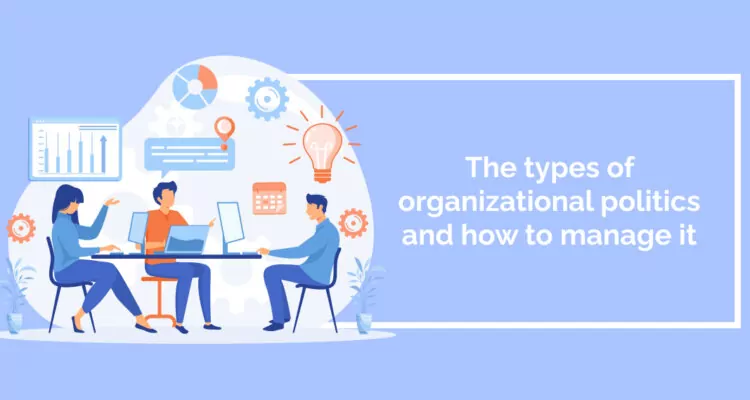
What behaviors do you observe as you glance around your office?
Suppose you see staff constantly arguing, competing against each other, or giving each other the cold shoulder after a disagreement. In that case, it may be time to reconsider your approach to organizational politics.
Organizational politics involves which staff members have more power than others, how they use it, and the impact it has on individuals and the organizational culture.
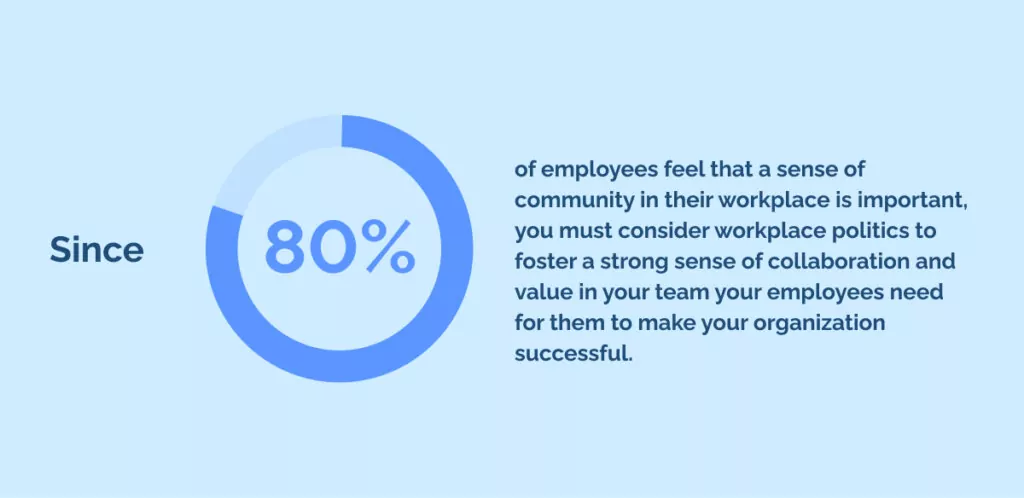
Since 80% of employees feel that a sense of community in their workplace is important, you must consider workplace politics to foster a strong sense of collaboration and value in your team your employees need for them to make your organization successful.
Organizational politics have positive or negative consequences depending on how leaders manage it, so it is essential to understand and influence it for a successful organizational change.
To help you, we will explore the following topics:
- What is organizational politics?
- What are the types of organizational politics?
- The impact of organizational politics
- How to manage organizational politics
- What are examples of positive organizational politics?
What is organizational politics?
‘Organizational politics,’ also called workplace politics, describes employees’ agendas in a company and their actions to obtain, boost, and utilize power and resources for desired results, often for themselves instead of their organization.
Most companies have organizational politics, so it is essential to consider how to manage it.
What are the aims of organizational politics?
Organizational politics’ aims are positive and negative, with four for each category.
4 positive organizational politics aims
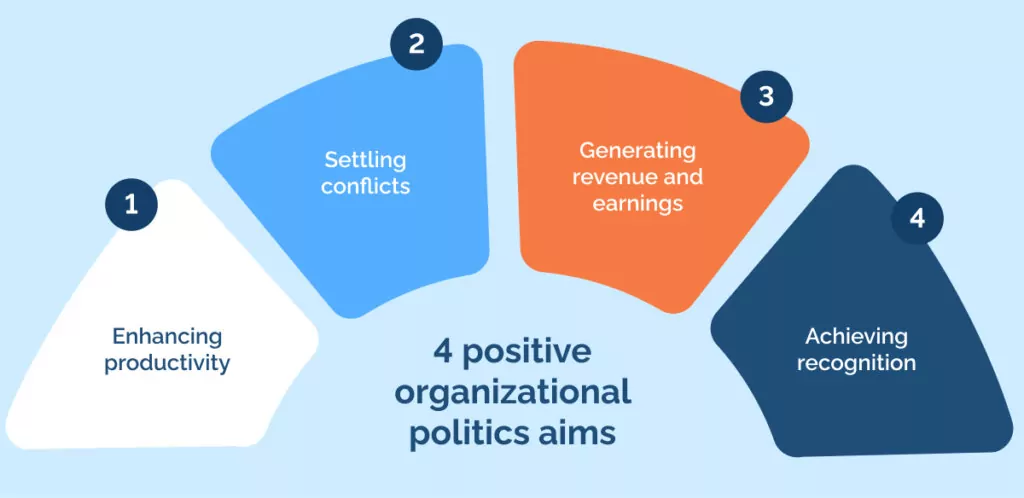
There are four main positive organizational political aims that you can promote for a healthy work environment.
- Enhancing productivity: Organizational politics can strengthen productivity to benefit the organization, individuals, and employee engagement.
- Settling conflicts: Settling conflicts ensures a positive company culture and discourages negative organizational politics, as staff can work harmoniously.
- Generating revenue and earnings: Everyone using their influence to generate revenue and earnings for their organization leads to a positive work environment.
- Achieving recognition: Recognition is a great way for individuals to practice positive organizational politics as they strive to outperform themselves and role model excellence in work practices to colleagues.
4 negative organizational politics aims
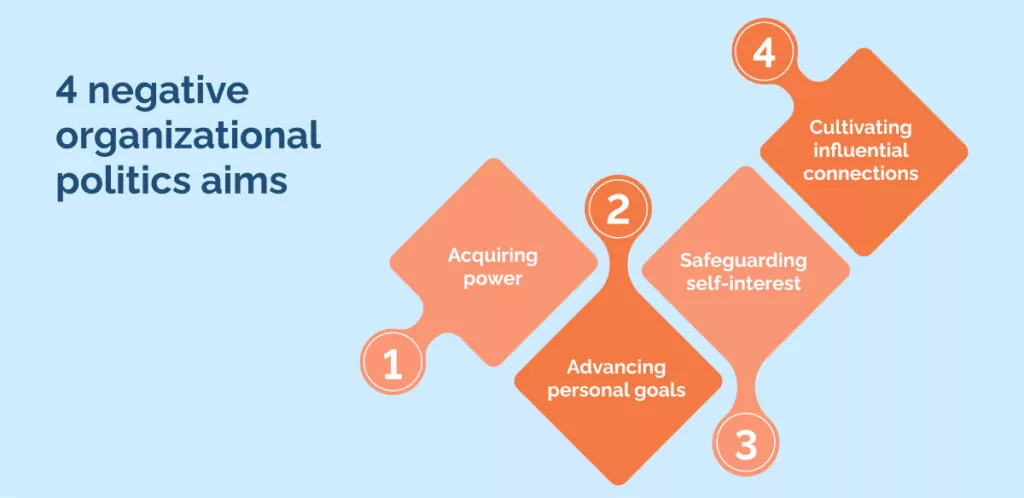
Here are the four negative organizational politics aims that can harm your workplace culture if left unchecked:
- Acquiring power: Staff can attempt to acquire power as part of personal or organizational interests, but if the aim is to develop power for self-gain, this is a negative political aim, negatively impacting the job satisfaction of others.
- Advancing personal goals: Advancing personal goals can be a negative political behavior when used without keeping the organization in mind.
- Safeguarding self-interest: Influence tactics and office gossip can be ways for a staff member to safeguard self-interest over organizational aims as part of destructive organizational politics that impact job performance.
- Cultivating influential connections: Professional relationships are essential for a thriving company culture, but cultivating influential connections can occur for the wrong reasons.
Consider these positive and negative aims when trying to influence organizational politics in your company to ensure you effectively manage workplace culture and employee productivity.
What are the 5 types of organizational politics?
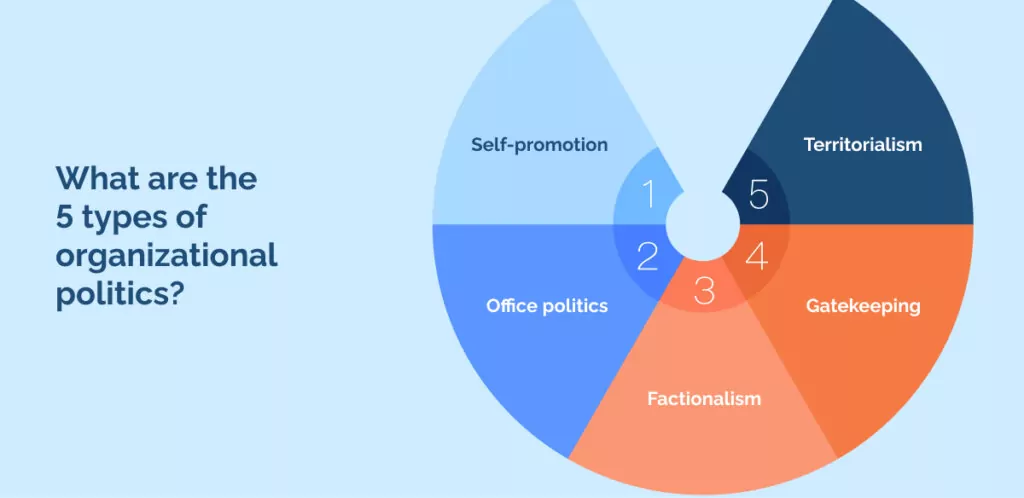
There are five types of organizational politics, and it helps to consider examples to help you identify the types of organizational politics in practice to help you influence them positively.
1. Self-promotion
When an employee acts to advance their career without considering the impact on those around them, this includes taking credit for others’ ideas and disparaging coworkers to elevate themselves.
2. Office politics
When an employee or group seeks to influence others through persuasion, manipulation, influence, or pressure. It can be beneficial for gaining support for an organization’s vision but may lead to tension and disputes if someone feels it comes at their expense.
3. Factionalism
A group divides based on shared tasks and interests, forming alliances aligned with their goals. It can foster innovation and agility in larger organizations but often results in a win-at-all-costs mentality.
4. Gatekeeping
Certain employees with existing power obstruct others and their ideas to preserve their authority and avoid challenges. This power hinders innovation and stifles talent development within the organization.
5. Territorialism
An employee becomes overly attached to a specific role or task, preventing others from taking it on, such as a manager refusing to delegate a project.
What are the 7 factors that contribute to organizational politics?
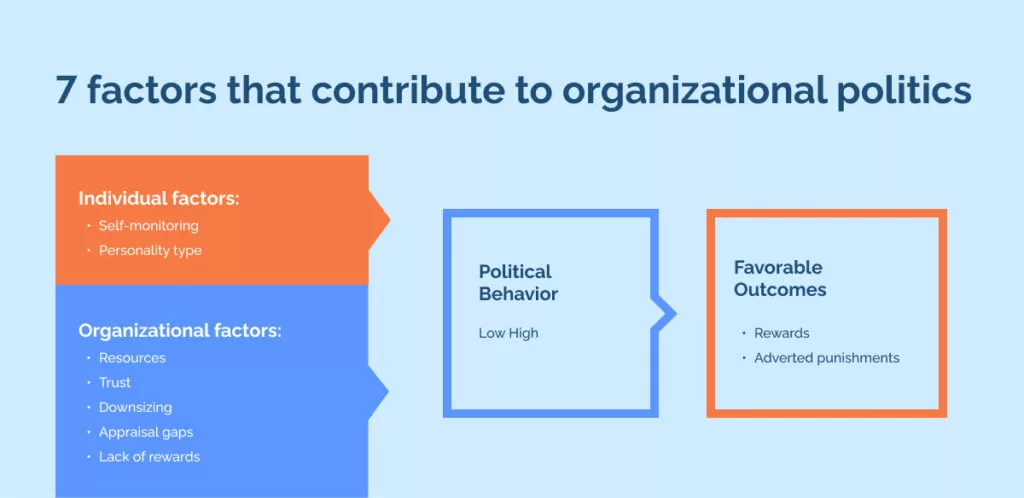
Look at these seven factors that contribute to organizational politics to influence organizational politics positively.
Individual factors
There are two factors to be aware of to ensure you equip yourself with the knowledge to promote positive organizational politics.
1. Self-monitoring
Employees with high self-monitoring, an internal locus of control, and a strong need for power are more inclined toward political behavior.
High self-monitors attuned to social cues tend to excel in political maneuvers compared to low self-monitors.
Individuals with an internal locus of control proactively manipulate situations to their advantage.
2. Personality type
Machiavellian personalities comfortably employ politics for self-interest.
Investment in perceived alternatives and expectations of success influences the inclination for illegitimate political actions:
- Greater investment and more to lose reduce the likelihood of illegitimate means.
- Abundant alternative job opportunities, a prominent reputation, or influential external contacts increase the willingness to risk illegitimate political actions.
- Low expectations of success in illegitimate means decrease their usage.
Organizational factors
Consider these organizational factors of organizational politics to ensure a healthy work environment for all staff.
1. Resources
Politics becomes prominent when an organization faces scarce resources, resource pattern changes, or promotion opportunities.
2. Trust
Cultures marked by low trust, role ambiguity, unclear performance evaluations, zero-sum reward allocation, democratic decision-making, performance pressures, and self-serving senior managers foster political behavior.
However, higher trust between individuals and their organization can lead to less need for occupational health psychology appointments and better personal relationships.
3. Downsizing
Downsizing drives employees to engage in politics to protect their interests.
Promotion decisions are consistently political in organizations.
4. Appraisal gaps
A longer gap between action and appraisal reduces accountability for political behaviors, so leaders should schedule appraisals regularly.
5. Lack of rewards
Zero-sum reward allocation promotes making others look bad to gain visibility.
Some managers resist spreading power out equally, relying on ineffective committees and group meetings, which can create resentment and prevent employees from receiving recognition and rewards.
The impact of organizational politics
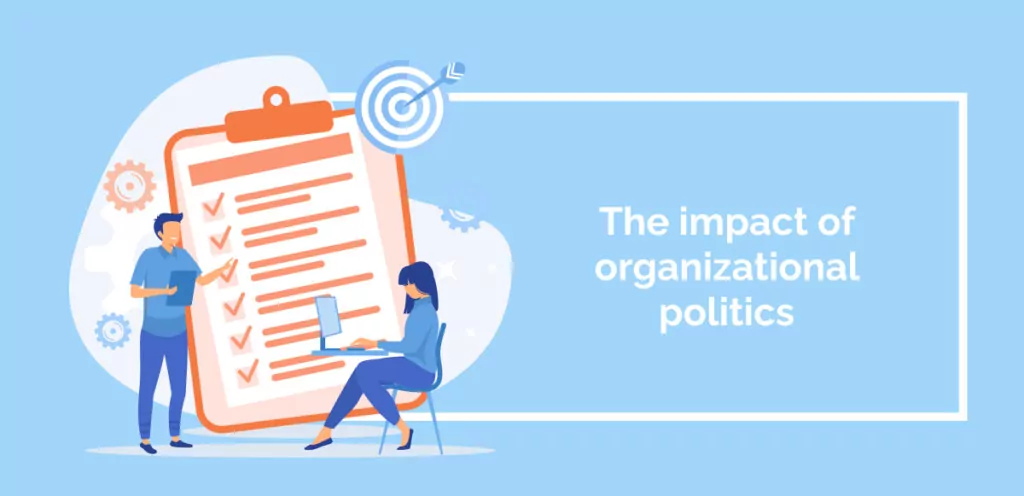
Employees with political acumen excel in power acquisition, stress management, productivity, and contributing significantly to organizational objectives.
Moreover, as a company expands, its survival may hinge on organizational politics.
Unbridled organizational politics, if left unchecked, can wreak havoc within a company.
Here are common adverse effects on employees:
- Escalated stress due to uncertainty and job insecurity.
- Reduced focus and productivity due to political distractions.
- Heightened cynicism leads to diminished morale and job satisfaction.
- Elevated employee turnover results in a shortage of qualified personnel and knowledge/skills.
- Communication breakdowns as both employees and managers remain in the dark.
- Ongoing resentment.
Be aware of the impact of organizational politics to ensure you avoid the negative effects before it occurs.
How to manage organizational politics in 6 steps
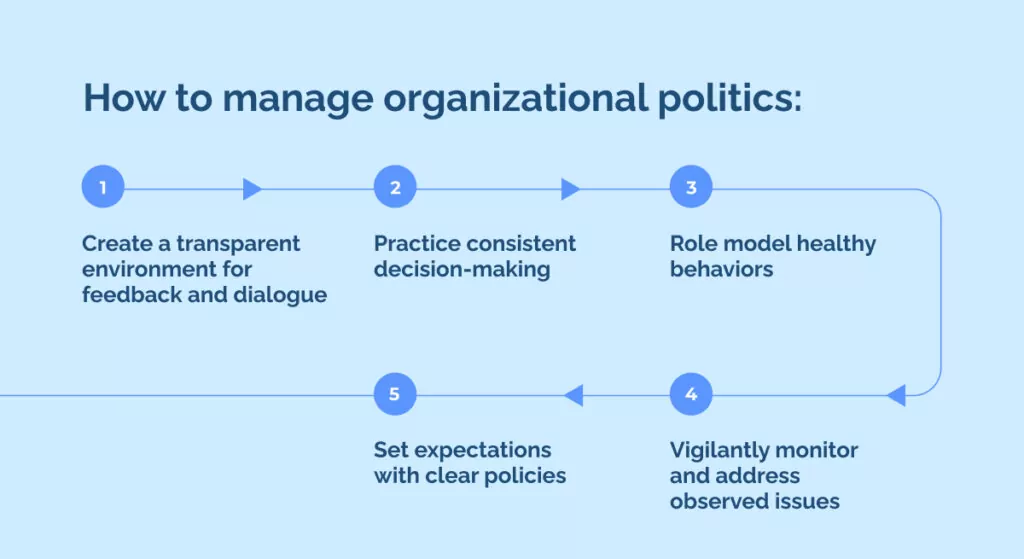
Although completely eradicating organizational politics within a large organization is unattainable, HR professionals, managers, and leaders can adopt these six steps to mitigate its adverse effects.
1. Create a transparent environment for feedback and dialogue
Political conduct flourishes in settings characterized by a deficiency in structure and transparency.
In workplaces where individuals lack the assurance that they can voice concerns to their superiors without facing repercussions, self-serving political behaviors tend to dominate.
The same applies when uncertainty about what’s ethically sound or who truly holds authority.
Avoid the silo mentality characterized by secrecy and obscurity, and instead advocate for an atmosphere where employees feel comfortable being forthright – and where they can also anticipate honesty from others.
Strive for a culture of transparency: store policies and procedures in conspicuous, easily accessible locations rather than concealing them.
2. Practice consistent decision-making
Few things breed resentment as effectively as organizational politics, leading to disparate outcomes.
When two employees commit identical infractions, the response should ideally be comparable, if not identical (unless mitigating factors like repeated violations or lack of awareness come into play).
Regrettably, most of us can readily recall instances where those who have already wielded power through political maneuvers have evaded more severe consequences.
This process includes leaders within your organization – and even within HR – who are not immune to the influence of organizational politics.
Here are some practical recommendations:
- Strive to implement rules in the same ways for everyone.
- Always reference past similar incidents to ensure equal and consistent treatment.
- Ensure that transparent policy rather than subjective politics drives HR encounters to make decisions impartially.
3. Role model healthy behaviors
No matter your role in HR, whether you are one of the managers, human resources leaders, or HR team members – others turn to you for guidance.
They closely monitor your actions and approach to organizational politics in participation and abstention.
They pay attention when you engage in someone else’s political strategies and when you consciously avoid doing so.
Therefore, your reactions when confronted with organizational politics can significantly impact.
If individuals observe you engaging in self-promotion or inappropriate gatekeeping, they will not only take notice but may emulate your behavior.
4. Vigilantly monitor and address observed issues
It’s essential to vigilantly monitor and address any issues that arise in the workplace to ensure workplace politics is helpful.
Many managers have likely encountered a variation of this principle: the more a problem lingers, the more challenging it is to tackle.
This scenario is due to unaddressed problematic behavior swiftly morphing into assumed acceptable conduct. When you intervene weeks or months later, fairness inquiries crop up immediately.
- “Why was this behavior tolerated last month?”
- “Are you singling me out because I’m ____?”
- “I’ve observed my superior engage in this behavior for years.”
Questions of fairness in this context can escalate beyond mere perceptions of organizational politics, evolving into discrimination concerns and reducing employee retention.
The remedy appears straightforward – at least in theory: proactively handle issues and consistently apply consequences impartially.
5. Set expectations with clear policies
Organizational politics thrive in ambiguous situations or a lack of explicit expectations.
Uncertainty and vague policies create an environment where individuals remain uncertain about the definition of success or high performance.
Opportunistic individuals seize the opportunity to shape their interpretations of success, primarily serving their interests rather than the organization’s.
Thus, as an HR professional or internal communicator, prioritize the removal of ambiguity. Establish unequivocal expectations through policies and communications and promote leaders with the right conduct.
Define how organizational politics can work for your organization
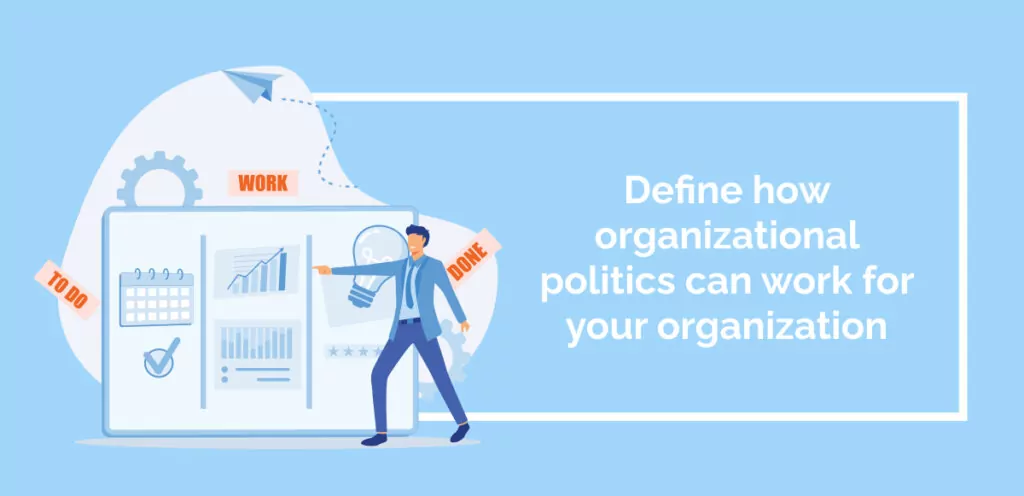
Understanding and harnessing organizational politics can be a strategic advantage for any organization.
By recognizing its dynamics and implementing measures to channel it positively, such as fostering open communication, collaboration, and fairness, organizations can turn this often-misunderstood force into a catalyst for growth and innovation.
Embracing these principles can increase employee satisfaction, enhance productivity, and create a more resilient, adaptable, and successful organization.
Mastering organizational politics can be a powerful tool in achieving long-term success and sustainability.
FAQs

How do you survive office politics?
There are three ways to survive office politics: First, try to calm yourself before responding to an upsetting experience at work.
Second, try to understand a situation from your colleague’s perspective to avoid conflict and find a solution.
Thirdly, try to manage your stress levels so you don’t get too influenced by the politics of others.
How do you avoid office politics?
Avoid office politics by constructing a reliable support network. This network can be a source of guidance and encouragement.
However, confiding in friends and family outside of your professional sphere is best when venting about work-related issues.
Lastly, always adhere to your workplace’s established rules and regulations.
What is organizational politics in decision-making?
Organizational politics involves incorporating individuals with relevant skills and experience into the process, making choices rooted in clear objectives, and involving the individual responsible for implementation in the decision-making process.
Tristan Ovington
Tristan Ovington is a professional senior writer and journalist, specializing in providing expert insights on various topics such as digital adoption, digital transformation, change management, and Cloud apps. He delivers his knowledge through accessible online content that is data-driven and presented in a friendly tone, making it easy for readers to understand and implement.



